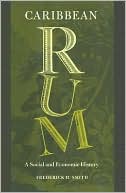Caribbean Rum: A Social and Economic History
Search in google:
Christopher Columbus brought sugarcane to the New World on his second voyage. By 1520 commercial sugar production was underway in the Caribbean, along with the perfection of methods to ferment and distill alcohol from sugarcane to produce a new beverage that would have dramatic impact on the region. Caribbean Rum presents the fascinating cultural, economic, and ethnographic history of rum in the Caribbean from the colonial period to the present. Foreign Affairs In his autobiography, Colin Powell recalls that his Jamaican-born parents exclusively served Appleton Estate rum produced on their native island: "To serve anything else was considered an affront." In Caribbean Rum, anthropologist Smith adds knowledgeably to the growing body of commodity-based histories, using rum to elucidate, in this case, the history of the Caribbean. He takes us on a journey beginning with the use of alcohol in indigenous Carib religious rituals, continuing through the impact of the American Revolution on British Caribbean rum makers (very negative), and moving on to more contemporary temperance movements. Depending on the sociohistorical context and the quantities consumed, rum can be enslaving or empowering, a symbol of colonialism or nationalism, commonplace or exotic, killer or elixir, sacred or profane. No single thesis unites Smith's entertaining narratives, although it is abundantly clear that the sugar and rum industries have repeatedly used political leverage and trade preferences — and claims of medicinal virtues — to win market shares from brandy, whisky, and gin.








